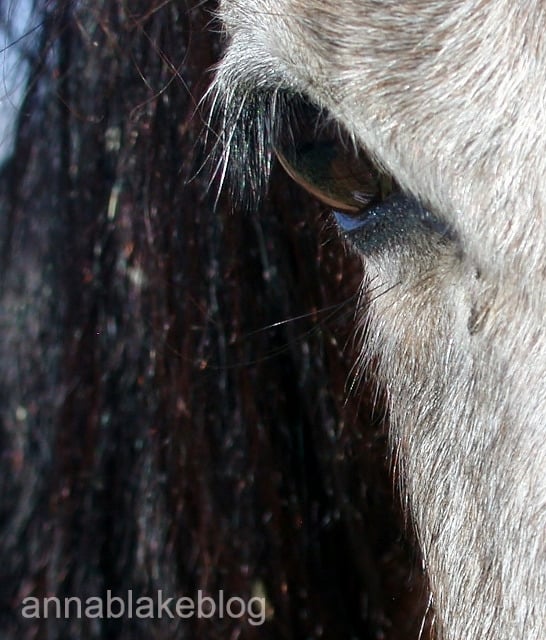 “Oh, Honey. You aren’t going to wear that, are you? Could you put some lipstick on, you are so much prettier when you smile. You should skip dessert, Honey, you look heavy. Are you dating anyone… don’t let him see your apartment looking this way. “
“Oh, Honey. You aren’t going to wear that, are you? Could you put some lipstick on, you are so much prettier when you smile. You should skip dessert, Honey, you look heavy. Are you dating anyone… don’t let him see your apartment looking this way. “
That same voice on your horse sounds like this: “Pick up your lazy feet. No, don’t do that! *pulls rein hard, metal on bone* Go, go, goooo! *spur, spur, spur.* I know you know how to do this. Why are you pulling away from me? Do it right a few more times and you can have a break. That’s not good enough. Try again.”
“You’re not good enough.” That’s the message. Does it sound any better coming out of you than it did your mother? Maybe your mother was the soul of unconditional love, I hope so. Do you ever think you aren’t good enough all on your own? Is that how you want your horse to see you?
Before you know it, you’ve become a complaining whiner who is never happy with anything, especially your horse. Is the art you want to excel at upper-level complaining? Maybe you know better than to blame your horse, so you say something like, “My horse tried hard, but I did such a bad job of riding…” When your horse feels that through you, do you think he hears the pronouns? No, he only hears “bad job.”
I remember a Toni Morrison interview, back in 2000. She was saying that when her kids got home, she looked at them with a critical eye to see if their socks were up, if their hair looked okay. Ms. Morrison said, “You think your affection and your deep love is on display because you’re caring for them. It’s not. When they see you, they see the critical face. But if you let your face speak what’s in your heart…because when they walked in the room, I was glad to see them. It’s just as small as that, you see.”
I’ve remembered this interview for so long because it illuminated the choice. Both statements were true: the external surface of messy hair and the love she felt internally, in her heart. She chose the tone of her Mother Voice.
Ms. Morrison says it’s a small change to show your heart instead of your critical eye. To me it’s more of an acquired skill. It’s not about how much we love horses or our commitment to riding. The truth is a lot of us were taught to see what was wrong because it’s an easier, cheaper way to seem smart. It is always easier to find fault than it is to affirm what is good.
It’s pretty common for a client (trainer, vet, farrier) to give me the eyebrow squint for rewarding a horse with a good boy before he has done anything. When did we get so stingy with encouragement? What is the resistance to encouraging try instead of standing back doubting?
Do you think being positive is acceptable for a trail horse, but not a performance horse? Is it okay for a lower level dressage horse, but do upper level movements require more enforcement because the work is harder? No. No again. If you want your horse to advance in training, you have to advance as a rider. Some of that is technique and some of it is becoming better at training positive confidence in both of you.
In defense of women, we generally aren’t that good at receiving compliments. Sometimes it’s easier to hear we’re wrong than to accept praise, for our horse or ourselves. We deflect with a joke or awkwardness. We are self-effacing to the point of dysfunction. When did confidence become as illusive as thigh gap?
The seed that grows is the one we water, and the choice is yours. Reward the good, and for now, ignore the rest. Start with, “I’m a good rider!” Did anyone believe you?
You have a default riding position: Heels down, centered in the saddle, shoulders relaxed. Do you have a default mental position? I encourage my clients to have a riding mantra. Make it up, something meaningful to you. Something that expresses how your heart feels when you see your horse. (If you heart doesn’t light up there’s still time to take up stamp collecting.)
I’ve used the same mantra every ride for over 25 years and it’s inanely simple: I love my horse. I say it even if I’m on your horse. As soon as my seat lands in the saddle, I take a deep breath and say it. I say it every time I halt at X to begin a dressage test and every time things start to come apart. I say it twice if I’m working with a rescue.
I say what’s in my heart before the first stride partly because there is still a horse-crazy girl inside, and partly because I am a professional and I’ve proven to myself time and again that it always gets better results.
If it’s hard for you to say, if your voice sounds tiny, choose a different Mother Voice. Maybe the Big Boss Mare in the Sky chimes in with, “Good Girl. Nice job, ride on!”
Anna Blake, Infinity Farm.
You need to be a member of Barnmice Equestrian Social Community to add comments!
Join Barnmice Equestrian Social Community